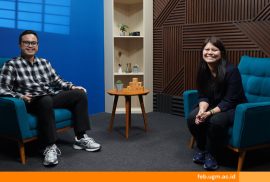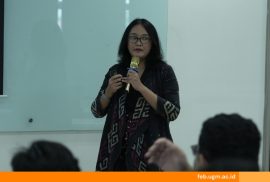The Accounting Laboratory, Department of Accounting, Faculty of Economics and Business (FEB) UGM together with the Master of Science and Doctoral Study Program (MD) FEB UGM held a Webinar Series with the theme “Philosophy and Approaches to Accounting and Business Research”. The introduction and understanding of philosophies and research approaches that are important for researchers as well as students in conducting research is the essence of the series. This Webinar series consists of 7 series of discussion sessions with 7 different topics for each session. On Friday (07/05), the 5th session of webinar series were held with the topic of the post-structuralism paradigm presented by Putri Paramita Agritansia, S.E., M.Acc. as a speaker at the session.
Before entering the presentation of the material which is the core of the program, Putri told a little about her initial background in knowing the post-structuralism paradigm. Currently, Putri is pursuing a PhD program in Australia and when she was about to carry out research, a question occurred to her. She wondered what accounting reports mean to many people and whether their meaning is equally accepted by one person and another. From there Putri realized that there is a paradigm that can accommodate her curiosity, namely post-structuralism. According to her, post-structuralism is an alternative paradigm to the existing mainstream paradigms in the world of research, especially in accounting.
Next, Putri explained that post-structuralism was born from the disagreement with the concept of the structuralism paradigm regarding the relationship between elements in human life which can be clearly explained by an organization/structure. The post-structuralism paradigm argues that not everything in the sphere of human life has a structure and its elements can be explained. According to post-structuralists, everything depends on something. Meanwhile, according to structuralists everything is neatly arranged.
Furthermore, the post-structuralism paradigm is rooted in the concept of understanding how language is used. The most basic concept of post-structuralism is what is called the signified and the signifier. A signifier is something that can be seen or felt with the five senses. Meanwhile, signified can be defined as what concept comes to mind when receiving the signifier. Putri also added, “Don’t forget whatever paradigm we learn, we have to fully understand the ontology and epistemology because it will be very important to design our research.” The ontology of this paradigm itself is relativism where reality is seen as relative because it depends on the subject. Meanwhile, the epistemology of post-structuralism is a social constructionist in which the way to know reality is to understand that reality is socially constructed.
At the end of her presentation of the material, Putri mentioned some of the relevance of the post-structuralism paradigm to accounting research, one of them is post-structuralists positioning accounting reports as text or narratives and analyzing them using various points of view. Its aim in the context of accounting research is to understand the meaning contained in, which will emerge, and be sourced from accounting reports. Beside that, compilers and users of accounting reports do not only depend on numbers but also language to be able to construct and translate accounting reports.
Reportage: Kirana Lalita Pristy/Sony Budiarso.




